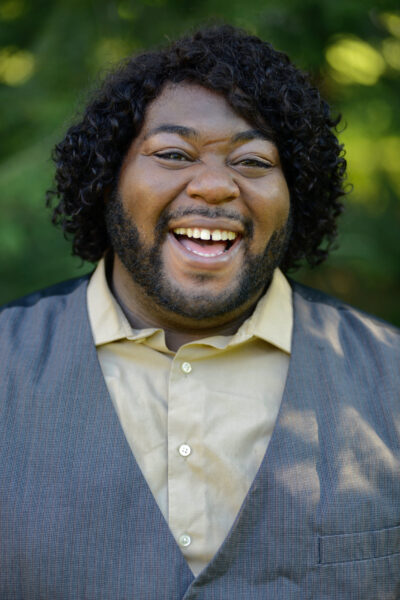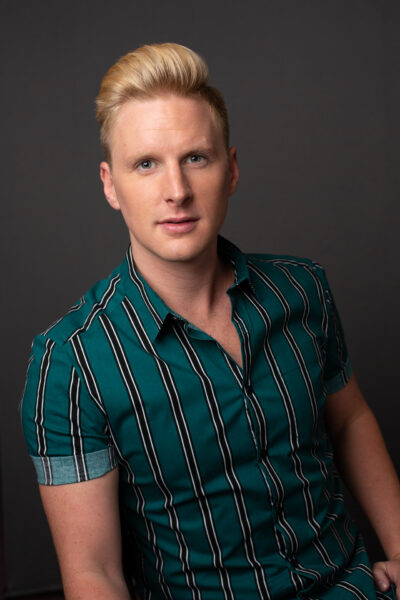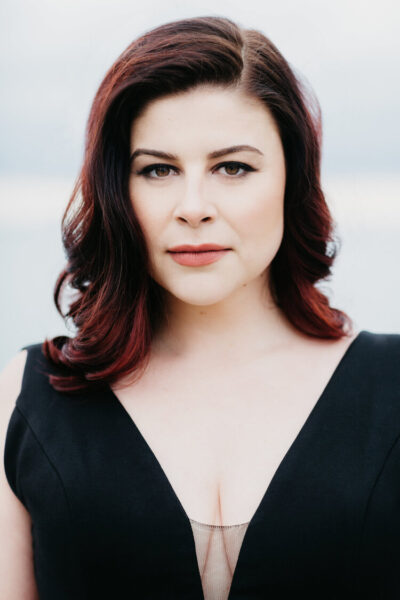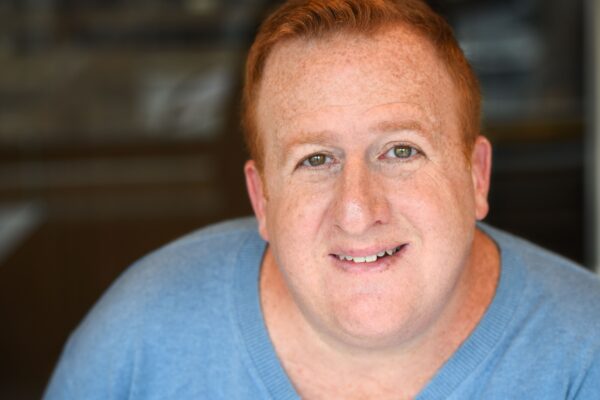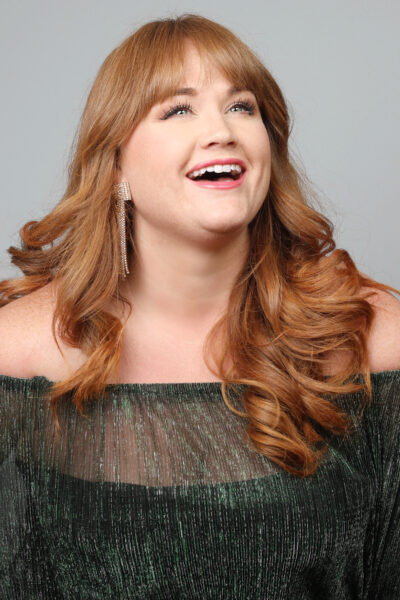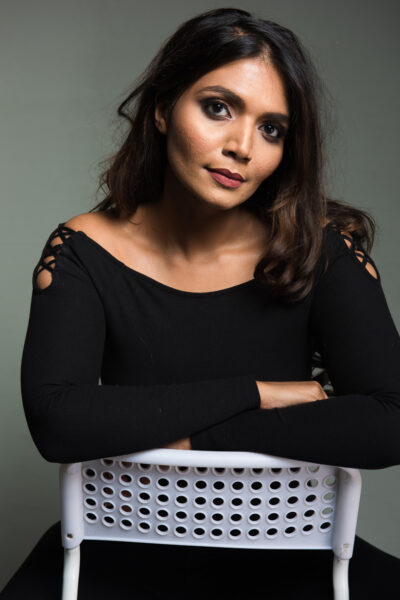Baritone Jeremiah Sanders is earning praise for “vocally powerful” (KDHX) performances with a “robust voice and a flair for comedy” (Herald Times) in classical and contemporary operatic repertoire alike.
This past weekend, Jeremiah sang as the baritone soloist in Brahms’ Ein Deutsches Requiem with the Chamber Singers of Iowa City, where they currently serve as a visiting professor at the University of Iowa. They opened their 2024-25 season with concert performances with the Indianapolis Opera and Skylark Opera Theatre, and performed in Stravinsky’s Pulcinella with the Manchester Symphony Orchestra. Coming up, Jeremiah sings in the Augusta Symphony’s Opera Gala, covers the Duke in Opera San José’s production of Bluebeard’s Castle, and performs the roles of Leporello in Don Giovanni with Madison Opera and Germont in La Traviata with Opera Today.
Jeremiah spent two seasons as a Resident Artist with the Minnesota Opera, performing roles including Marcello in La Bohème, Abilene’s Father and Bryce’s Father in Edward Tulane, Mago in Rinaldo, and Hortensius in La fille du regiment. They also played the role of Beau in Service Provider, about which Talkin’ Broadway wrote, “he skillfully handles vocal duties with his robust voice, while showing a flare for the libretto’s comedy.”
Jeremiah grew up singing in church choir from a very young age with their Madea (Great-Grandmother) in Marion, Indiana, and immediately knew that they would lead a life in music. “I really fell in love with music in a way that made me hungry for it,” Jeremiah says.
“Music is something I would seek out – I think my family would say – at every hour of the day,” laughs Jeremiah. “Growing up, I threw myself into making a lot of different types of music that opened me up to the performing arts. I did cheerleading, color guard, played viola,and eventually dance – I was always putting on some sort of spectacle at home! And I always felt very supported.”
Once Jeremiah was in high school, they joined the show choir, and participated in a multitude of leadership and performing arts clubs like theater, drama, and debate, all of which served to make them think more comprehensively about character development. “I didn’t realize that in those years I was really building the skills that I needed to be an opera singer. But in my small community I got a lot of support, and gained the tools I needed to become a compelling storyteller.” There, Jeremiah also learned about theater as a whole. “I got to hang lights and gels, and pull curtains, I even got to write my own play. I really feel grateful for the upbringing that I had, because it was so artistically rich.”
After high school, Jeremiah decided that the natural course was to go to college to become a choir teacher. But soon after arriving at Manchester University in Indiana, Jeremiah’s professors had other things in mind. “My undergraduate voice teacher, Debra Lynn, said, ‘Choir teacher?!? You’re going to sing at La Scala some day!’ I had no idea what that meant at the time, but now I do!” Jeremiah recounts seeing a Metropolitan Opera broadcast of La Traviata freshman year. “I was weeping. I was taking in every minute detail – every single thing captivated and moved me. It became my internal measure for performing on the stage – finding out how I can make the audience feel something like that.”
Jeremiah stayed in Indiana to continue schooling, earning a master’s degree from Butler University, and completing both a Performer’s Diploma and their Doctorate from Indiana University in 2024. “Each of those programs fostered and nurtured where I was, which was so important to me as a person who had so many different passions,” says Jeremiah. “By the time I got to IU, I was just blessed with resources.” They were cast in more than five productions during graduate school, which propelled them to earn a spot in Minnesota Opera’s Resident Artist Program.
“It was like stepping into the big leagues,” says Jeremiah gleefully. “And it was so much fun to have that as a challenge!” Among many roles there, Jeremiah was cast in new works including Paola Prestini’s Edward Tulane and John De Los Santos’ Service Provider, and sang in a recital of works by historically marginalized composers. “As a musician and artist, I love getting to step into things that are fresh and use my tools to create something that hasn’t been done before.” Jeremiah also loves to use their voice to share works by African American composers, and to advocate for underrepresented composers in classical musical education.
Over the last few years, Jeremiah has also enjoyed success on the vocal competition circuit, winning the Kurt Weill Award in the Lotte Lenya Competition, securing district wins with the Metropolitan Opera Laffont Competition in Kansas City and Indianapolis, and taking first place in the Opera Ebony Voice Competition and the Friends of the Symphony Orchestra Young Artist Competition.
Jeremiah first met Miguel Rodriguez, President & Founder of Athlone Artists in Minnesota, and again when performing with Des Moines Metro Opera the subsequent season. “I liked him right away,” says Jeremiah of Miguel. “I felt there was a good connection and we share the same values.” When Miguel asked for a few roles that Jeremiah might like to perform now and the future, Jeremiah laughs, “I think I maybe surprised him – I sent him a long Google doc with what I wanted to be singing in the next five years, the next ten years, and after that!”
Jeremiah is effusive when speaking about those who have helped them along the way. “I’m so grateful that I’ve had such powerful connections and insightful mentors to help me get to where I am currently. So many in my life have really helped me become the best version of who I am. Professionally, Debra Lynn, Noelle Lehman, Jane Dutton, Kirsten Gunlogson, Mario Antonio Marra, Michael Shell – but especially these mentors have helped me become who I am, informed how I think about my stagecraft, and taught me to nurture my artistic output.” Having recently accepted the position of visiting professor of voice at the University of Iowa, Jeremiah also cites them as role models in teaching. “I have been able to see them teach at such a high level, and I’ve internalized those values of what it means to be a teacher. Being a multi-passionate is what I do, and I couldn’t have done any of this without having a lot of support from my family, friends, and those four mentors.” Jeremiah also notes, “My Madea is gone, but everything I grew up with is still present. Her essence is always with me.”
